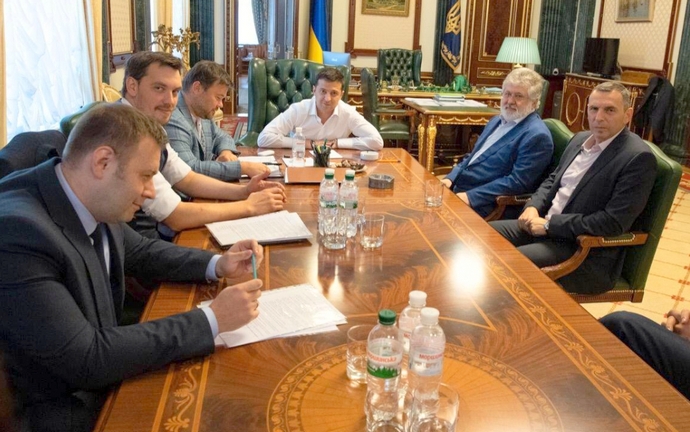Eventually, 270 MPs voted for it. In particular, 200 from the President's Servant of the People faction, 23 from Petro Poroshenko’s European Solidarity faction, 18 from the Voice (Holos) faction, 16 from the Trust (Dovira) faction, three from the faction For the Future, and 10 from independent MPs. Pro-Russian Opposition Platform for Life and Yuliya Tymoshenko’s Fatherland (Batkivshchyna) were the only factions not to make a single vote. Before the voting, Tymoshenko called the bill unconstitutional and stated that her backers will dispute it in the Constitutional Court.
Why does the bill refer to Kolomoiskyi?

“Amendments terrorism” between the two readings
On 30 March, 267 MPs voted for the bill in the first reading. However, progressing to the second vote was not easy, since a number of MPs went down the path of filibustering, by submitting some 16,000 amendments, which rendered it impossible to pass the bill any time soon. The majority of amendments were made by the Servant of the People MPs associated with Kolomoiskyi. One of them, Anton Poliakov, made 6,000 amendments himself. Although the oligarch denied any involvement in the amendments, he called the bill not anti-Kolomoiskyi, but anti-Ukrainian. According to regular procedures, any amendments to a bill must first be considered by the relevant committee. Only then, and if the author of the amendments insists, Parliament needs to vote for each of them individually. Under these conditions, any consideration of the bill would be delayed for several months. Ruslan Stefanchuk, the Deputy Head of the Parliament went so far as to call the situation “amendments terrorism.” The Financial Committee was able to consider all the amendments in just four days, recommending that MPs support the bill in the second reading. However, to avoid the need for all of Parliament to undergo what would be an unreasonably lengthy process that would last many months, a special solution was needed. In mid-April, MPs finally agreed to support a change to its regulations that foresees a special procedure for consideration of bills, in the event of an excessive number of amendments in the second reading. Dmytro Razumkov, Parliament’s speaker stated that the changes to the regulations will be applicable during the quarantine, plus another 30 days. Regarding the anti-Kolomoiskyi bill, the new regulations helped to reduce the number of amendments for consideration in the second reading to 241.The essence of the bill: making it impossible for owners of insolvent banks to return them

- If the ex-owners of the bank have received compensation for damage caused by the illegal classification of the bank as insolvent, revocation of the bank's license, or liquidation of the bank, are not released "from civil, administrative or criminal liability for their actions."
- The lost profit is reimbursed "in the amount of income that a bank member could actually receive," if the National Bank has not decided to liquidate the financial institution. Lost profit is reimbursed only if such benefit was not taken into account, when assessing actual losses (share value).
- Real losses are determined in the amount of the value of the bank's shares on the day of the National Bank's decision to classify the bank as insolvent or revoke the banking license and liquidate the bank (settlement day).
- The value of shares is determined in the report on the state of financial and economic activity of the bank, prepared by an internationally recognized auditing firm that meets the criteria set by the National Bank of Ukraine. Such assessment of the financial and economic activities of the bank and the value of shares is appointed by the court, which considers the case of compensation for damage.
- The court may not reject the auditor's report on the state of the bank.
- An appeal against a decision, act, or action of the National Bank shall not suspend their execution. Courts can not suspend the National Bank’s decisions in securing a lawsuit.
"When the situation resolves, the focus may again shift to solving the problems of long-term structural reforms in Ukraine in order to promote stronger and more inclusive growth,” he said.Matti Maasikas, the head of the EU Delegation to Ukraine has already welcomed passing the bill, calling it “a vital measure to protect public finances and Ukrainian taxpayers.” Meanwhile, the author of the 6,000 amendments, Poliakov, registered a decree in Parliament to cancel the voting. Read also:
- Ukrainian parliament approves at first reading bill against oligarch Kolomoiskyi to receive IMF loan
- Ex-National Bank director’s house burns as deal suspected between Zelenskyy and top Ukrainian oligarch
- What Ihor Kolomoiskyi hopes for in the last battle of Ukrainian oligarchs
- Oligarchic shadow of Ukraine’s 2019 elections
- In Ukraine, oligarchs set the election agenda using their TV
- Russian oligarchs in Europe: soccer, churches, and working for the Kremlin





